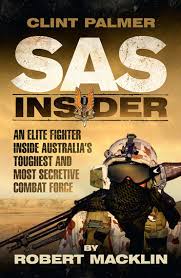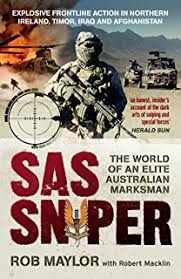Gadfly 40 - SAS operatives in Afghanistan
- The Beagle
- Jun 20, 2018
- 3 min read
The recent revelations of alleged war crimes by a small group of our elite SAS operatives in Afghanistan were deeply disturbing.
The allegations – that in 2012 a Patrol leader kicked an Afghan prisoner over a cliff and that he was later ‘finished off’ by gunfire – are of course inexcusable. So indeed is the idiotic carriage of a Nazi flag on a Special Forces vehicle. And I have to report that there are more sensational revelations to come when the investigation by NSW Supreme Court Justice Paul Brereton is completed later this year.
But that is only part of the story.
In the last decade I have written three biographies of SAS soldiers[1] – as well as a history of Australia’s Special Forces in Warrior Elite – and two of the three soldiers involved have become close and valued friends. All three served in the moral quagmire that is Afghanistan; and while they all took part in frontline actions, none was involved with those accused of the alleged incidents.
Special Forces occupy a curiously ambivalent position within our military. To the public they’re our super soldiers; to our politicians they’re the ‘go-to’ group in any conflict, from anti-terrorism to battlefield insertions. However, to their more conventional colleagues in the ‘Big Army’, they’re like Lady Caroline Lamb’s view of Lord Byron: ‘mad, bad and dangerous to know’.
The SAS Regiment sees this as part of their mystique; and in many ways they are a law unto themselves. Their officers are aware of this and work hard to keep it within bounds. But in a morally compromised situation like Afghanistan at the time, it’s almost inevitable that there will be personalities who break the rules.
In Afghanistan, their tasks included the planned assassination of ‘bad guys’, identified as Taliban leaders or other Islamist extremists – either among Afghans or other nationalities. And of course ‘assassination’, however it is dressed up, is taking a human life.
Calling it an act of war is supposed to excuse it. But even it if did, we have not declared war on Afghanistan, nor the Taliban. Nor have we gone to war on Islam or the gradations of violent interpretation of its doctrine until they’re labelled ‘terrorist’. Once that limit is reached President Obama (in charge at the time of the allegations against the Australians) willingly ordered assassinations via drones. And no one turned a hair.
The Australian SAS operatives did not have the luxury of assassination by distant drone. They were tasked to do it face to face, either through a rifle scope or in close combat. They were told it was morally justified. The ‘bad guys’ were dehumanised as ‘the enemy’.
Their own experience confirmed it. Their colleagues were maimed and killed by IEDs. Some of the Afghans who joined them suddenly turned on them and killed their mates. As one of my former SAS mates told me last week, ‘Each day outside of Camp Russell every man was on edge wondering whether it would be him that was going to be killed or lose limbs from an IED.’
They came to despise Afghans in general. The Afghan men, they said, ‘had women for babies, boys for sex’. It was almost impossible to differentiate between the enemy and the sullen collaborators who would ‘say anything’ if the pay was good enough. And it was sickening the way they used kids as shields.
The SAS soldiers had invested their loyalty in the chain of command that provided them with the moral structure that guided their actions. Yet they were not automatons. They knew that this moral code was deeply flawed for the evidence was all around them. And when your own life is on the line, that concentrates the mind like no other.
Alas, from time to time individuals among our frontline troops, however well trained, broke the ‘laws’ of combat, fell victim to PTSD or both. And as it happens, last week another SAS veteran, a friend of my family, took his own life in Newcastle where he’d been living in his car.
Tragically, it seems, in 2012 one flawed personality within that chain lost control and brought dishonour to the Regiment. His actions were inexcusable, even if they were understandable. But what of the men who sent and kept them in that hellhole when other countries had departed? And what of us, the Australian people, who permitted the continuing intervention, and in some cases even applauded it?
[1] SAS Sniper, Redback One, and SAS Insider








